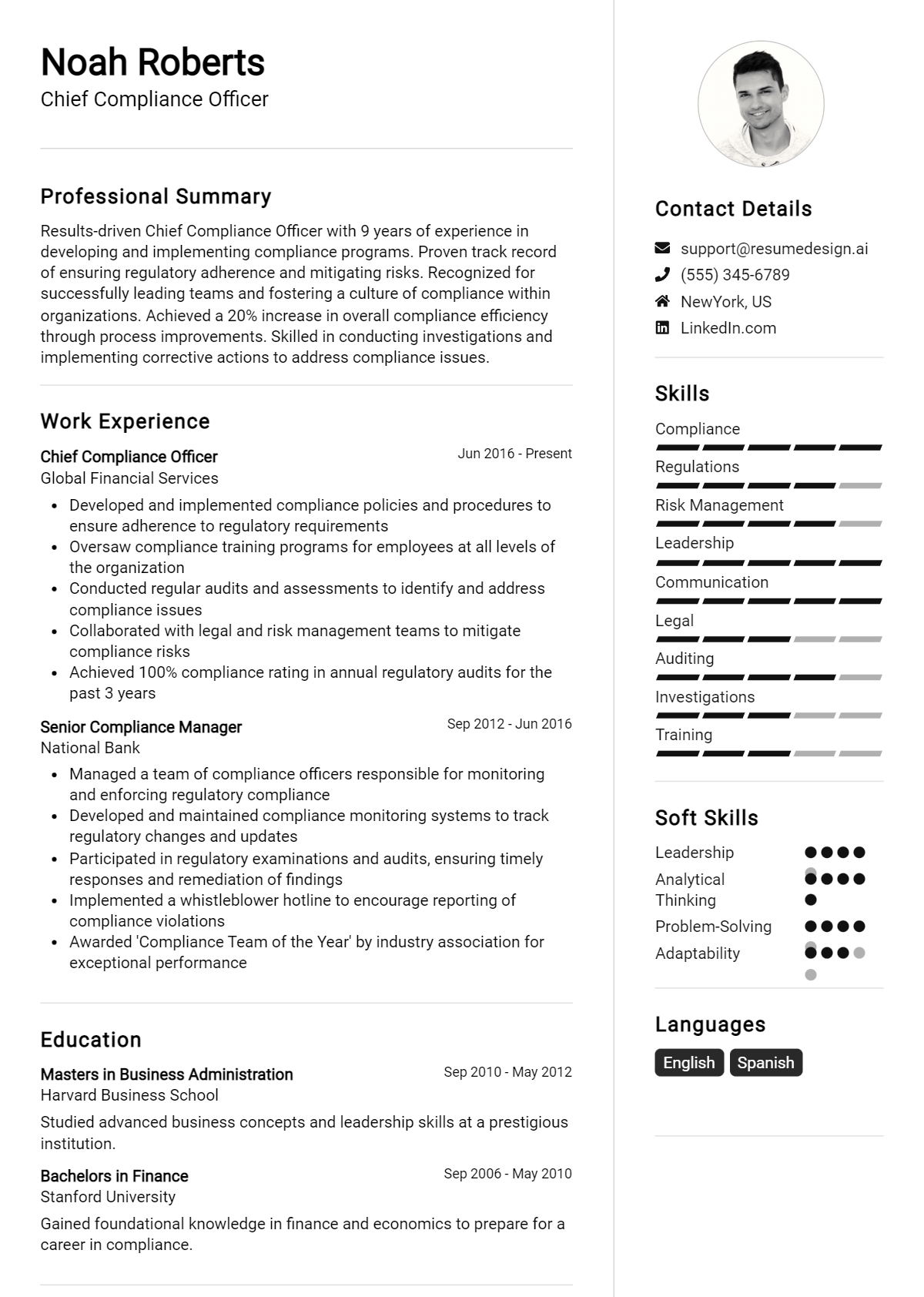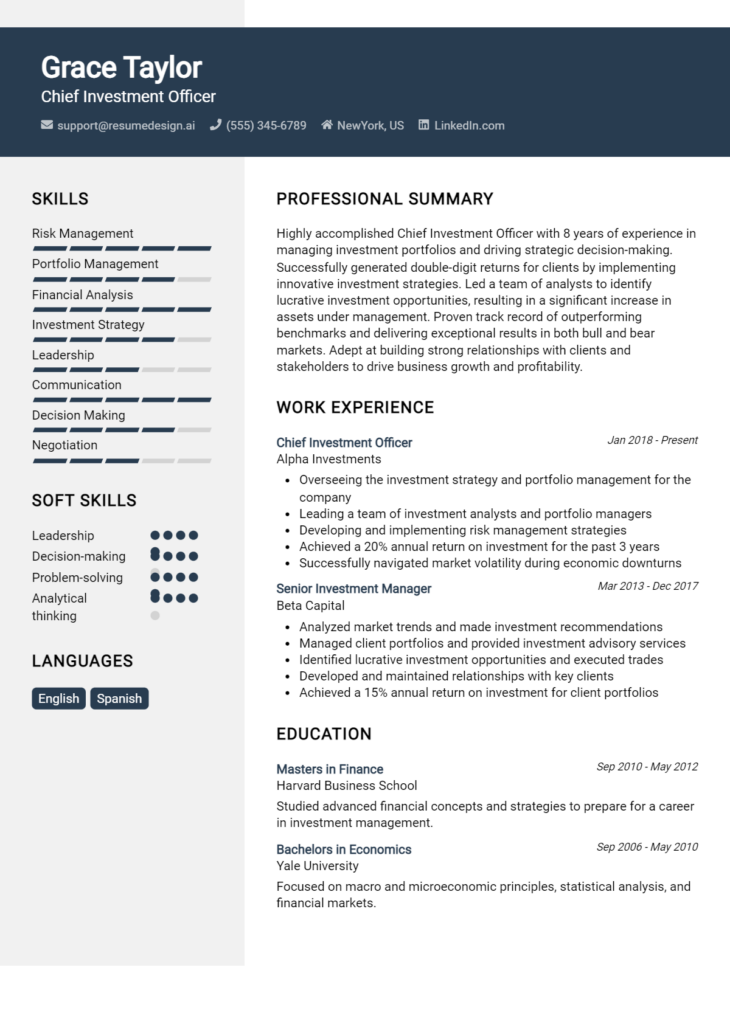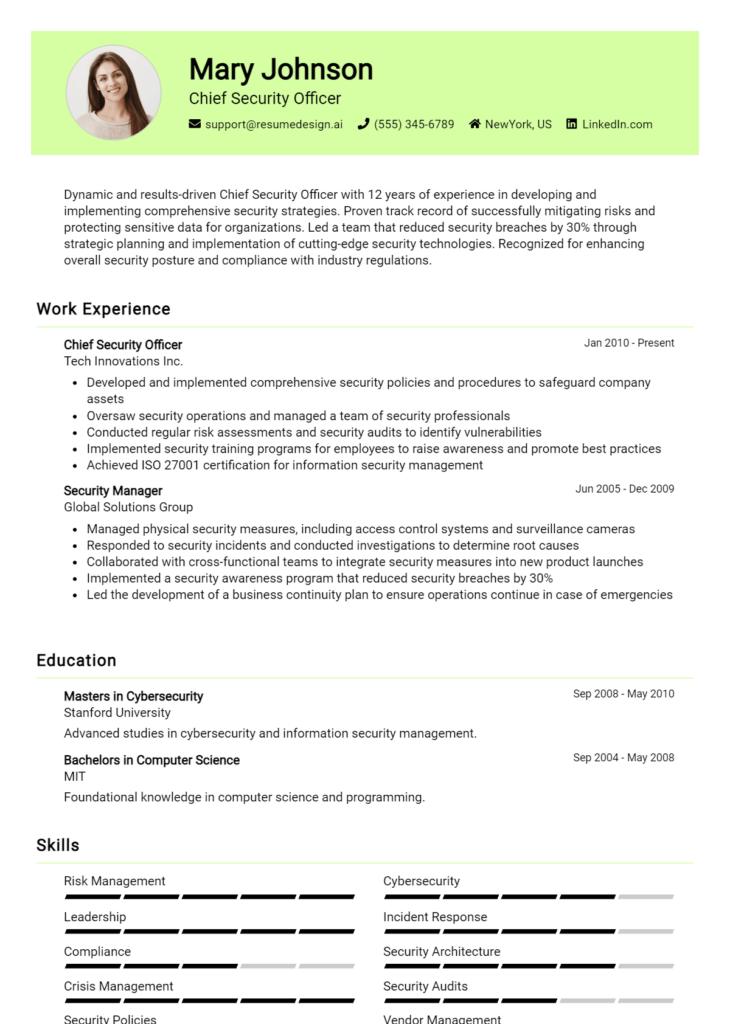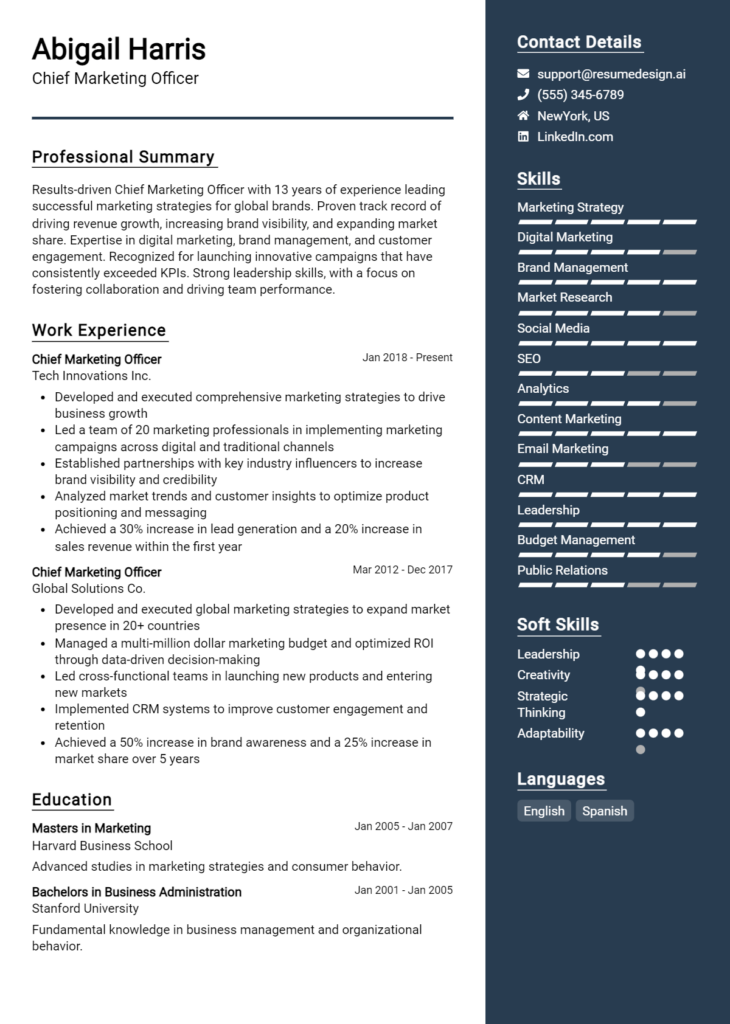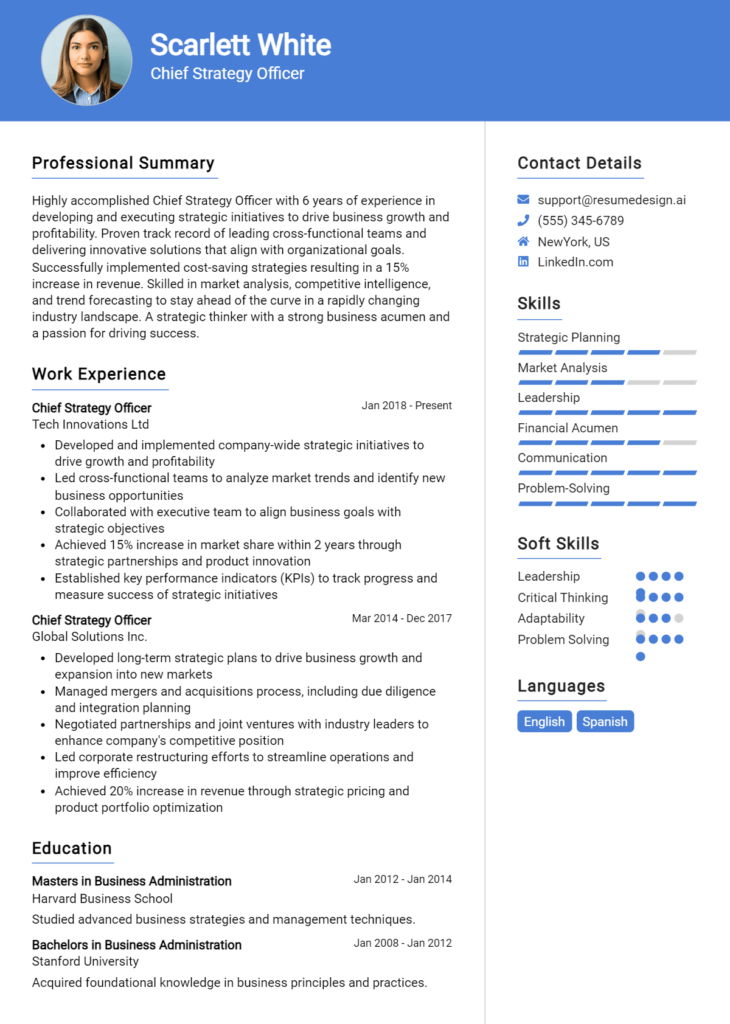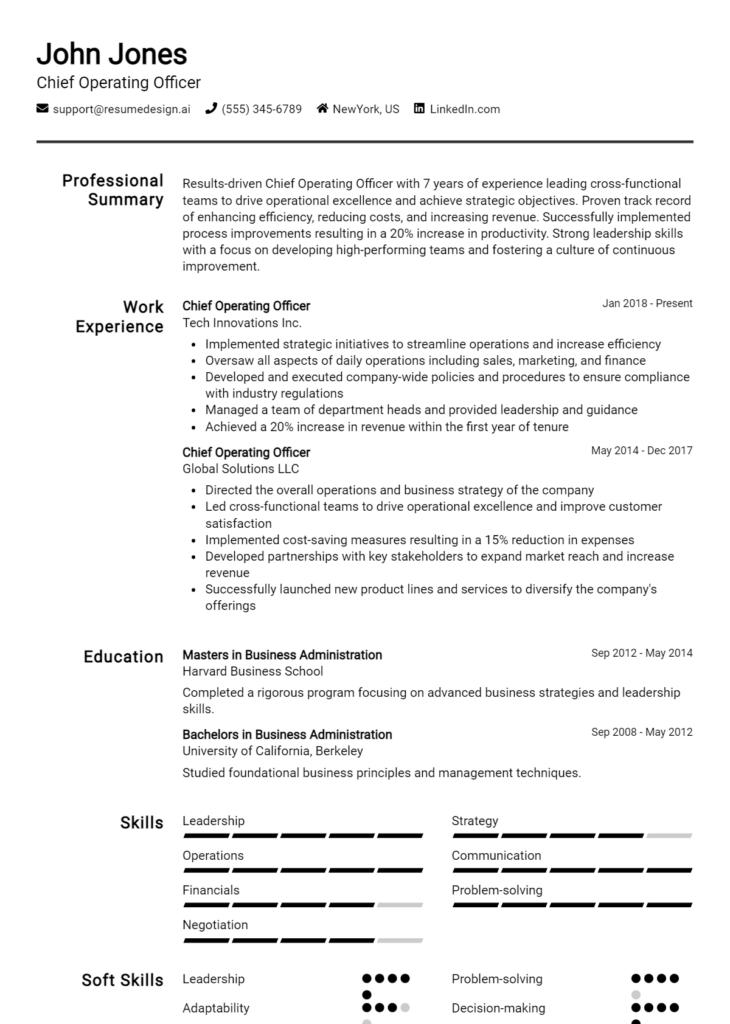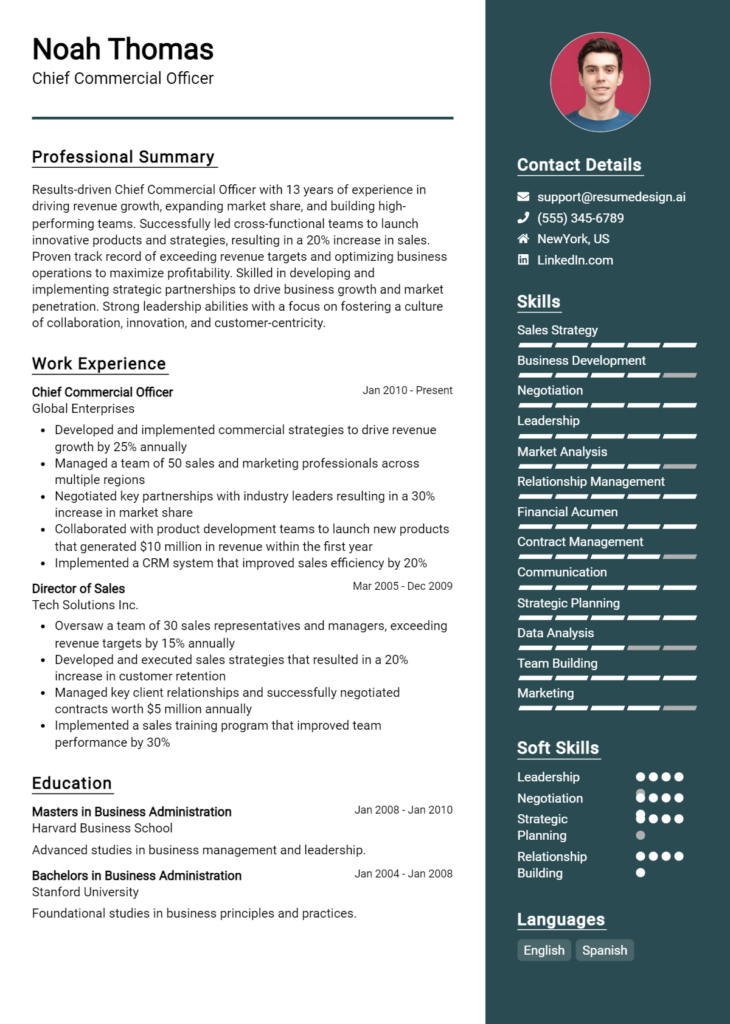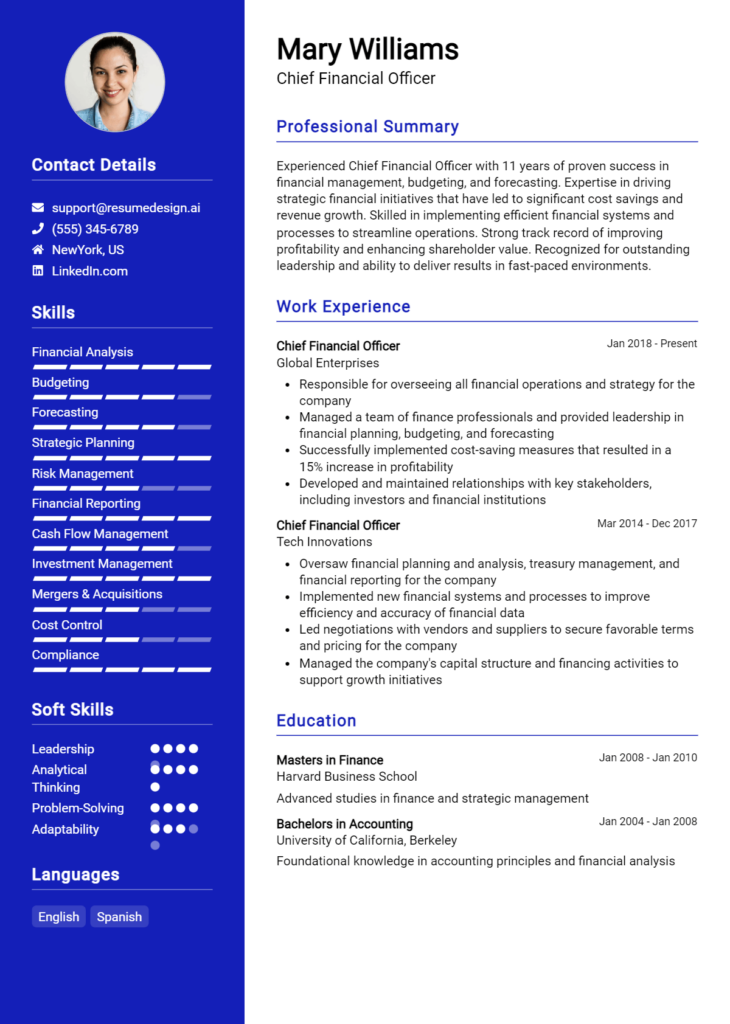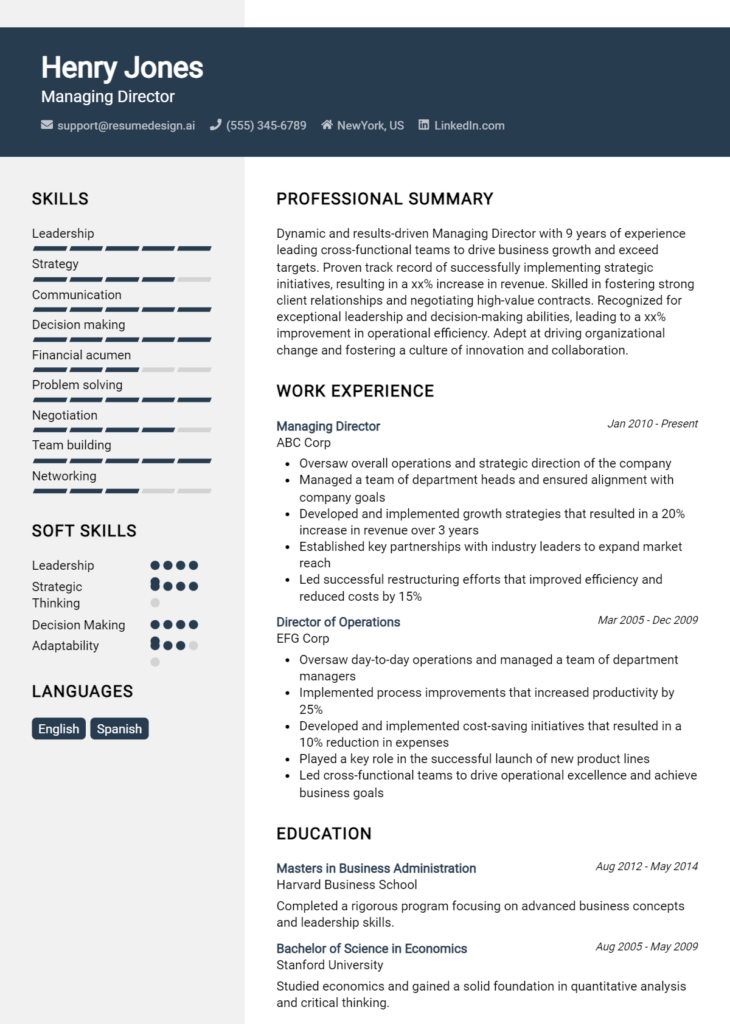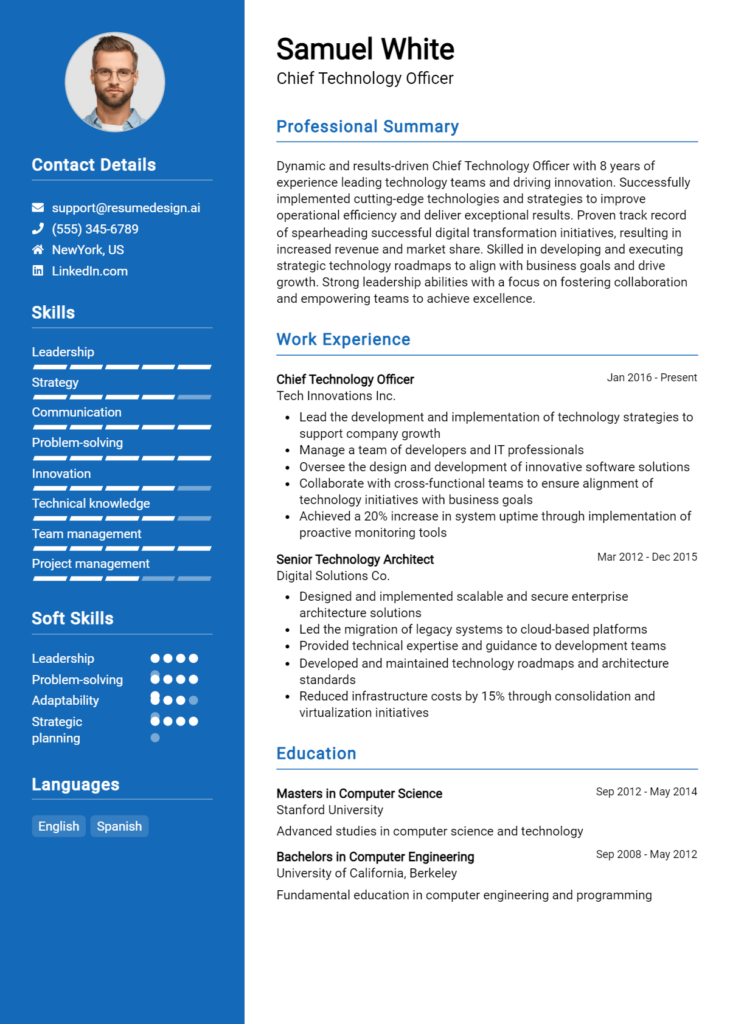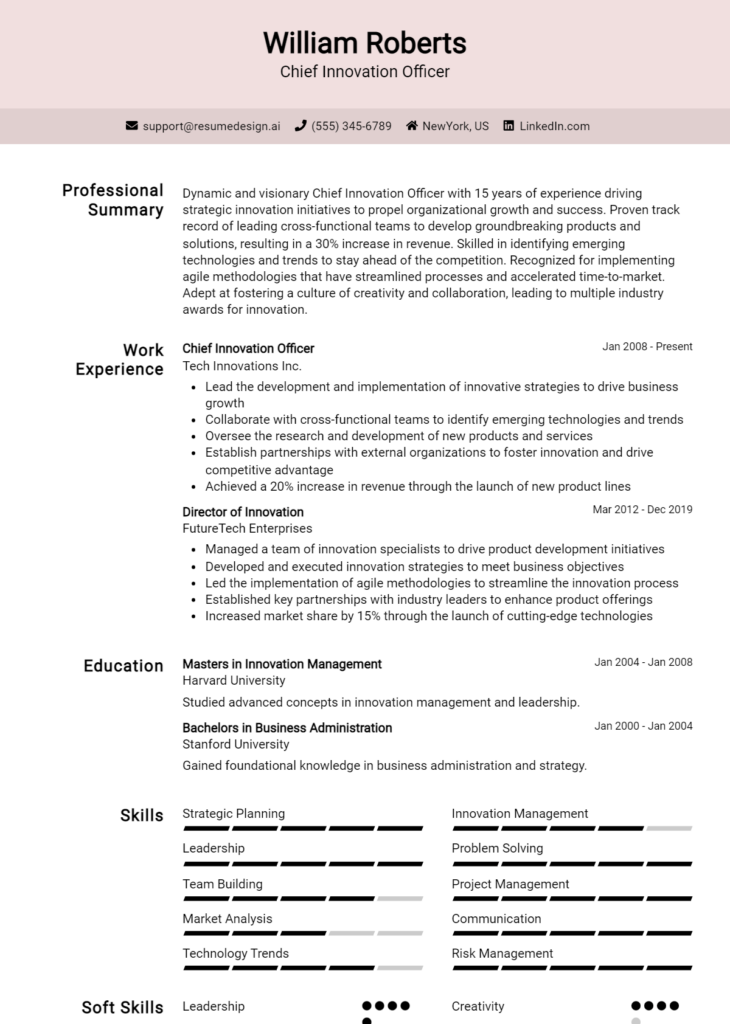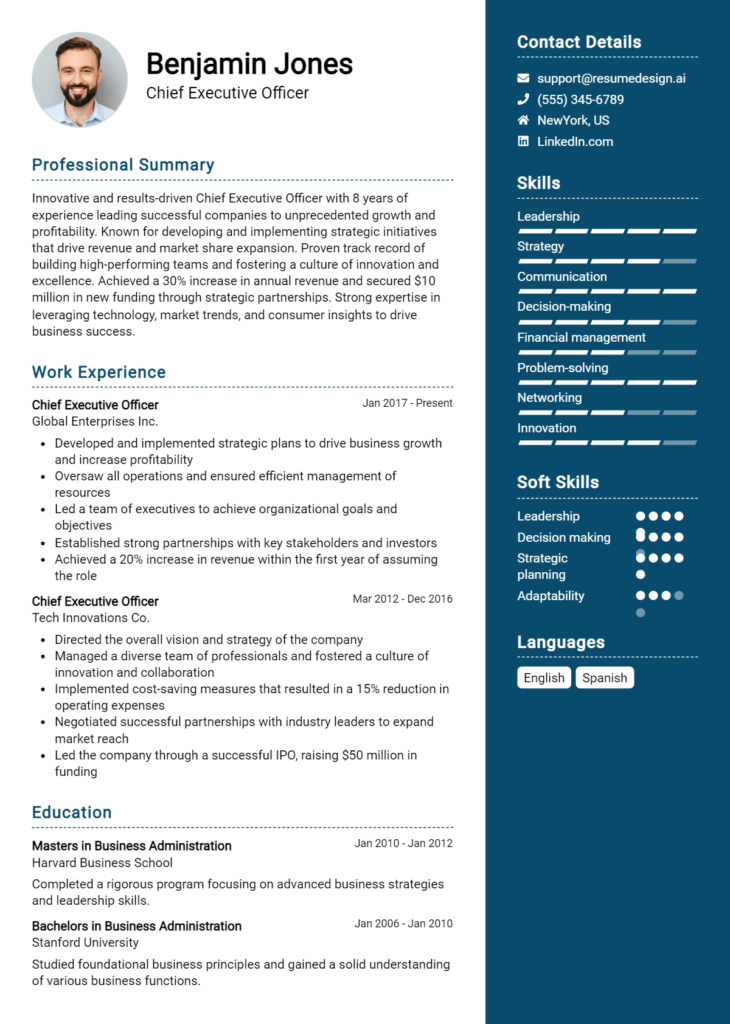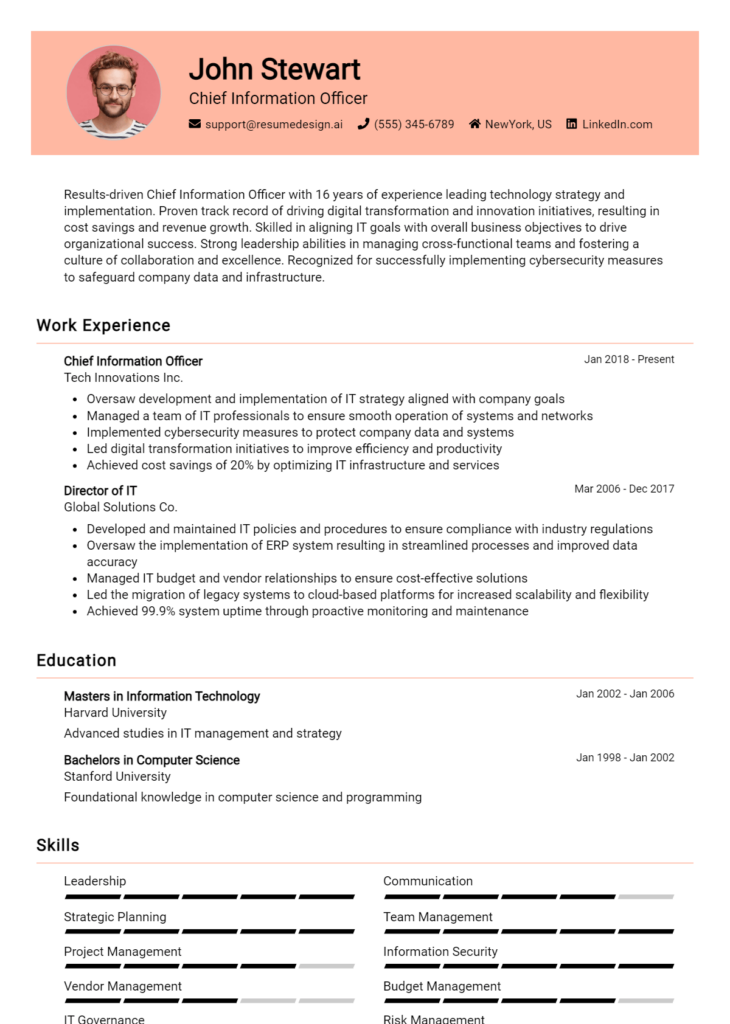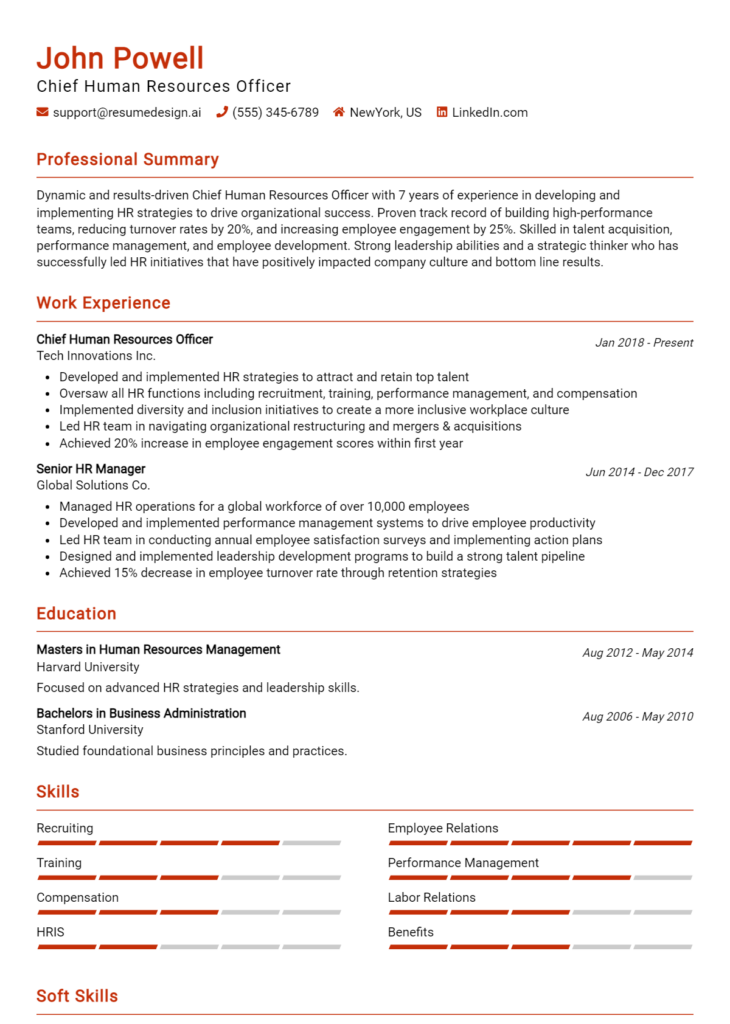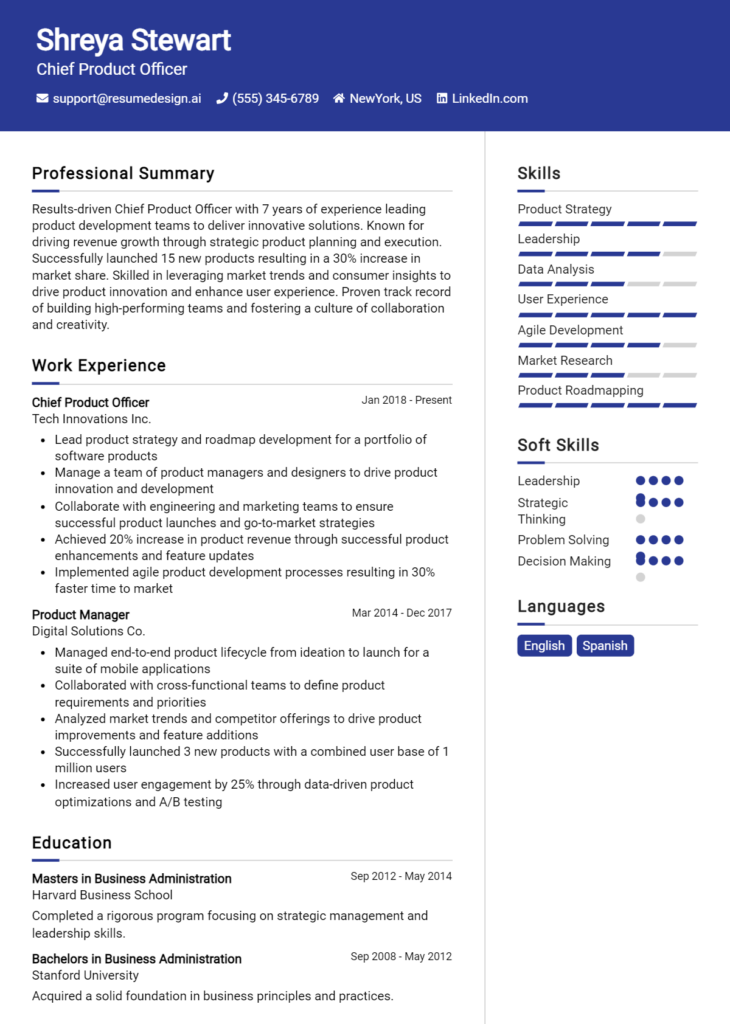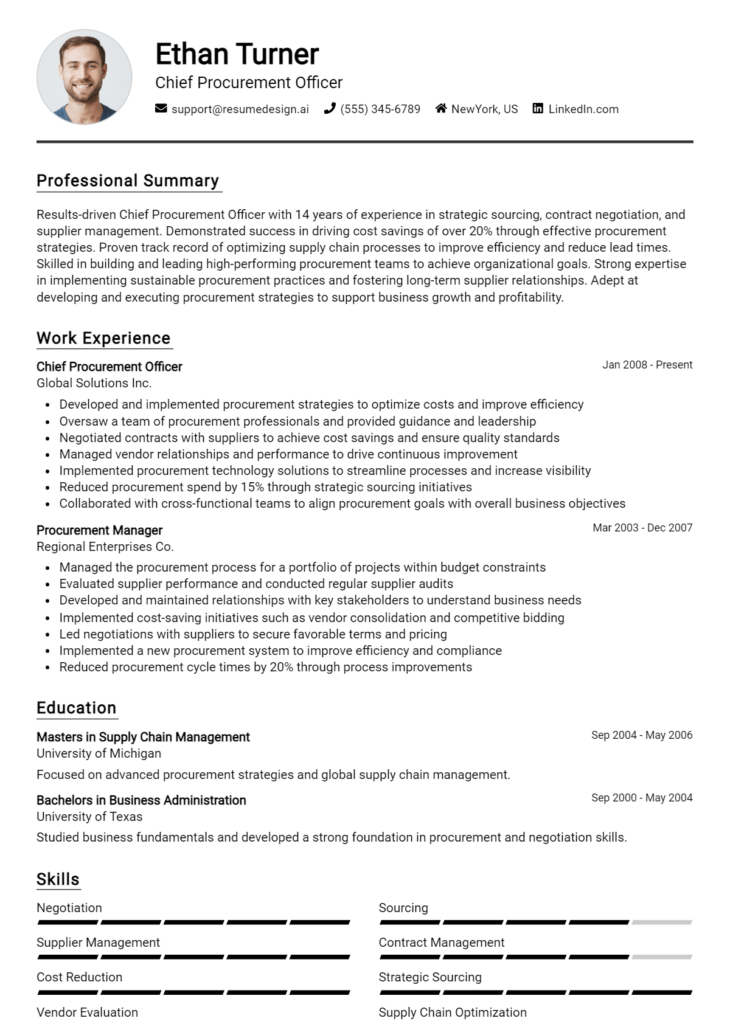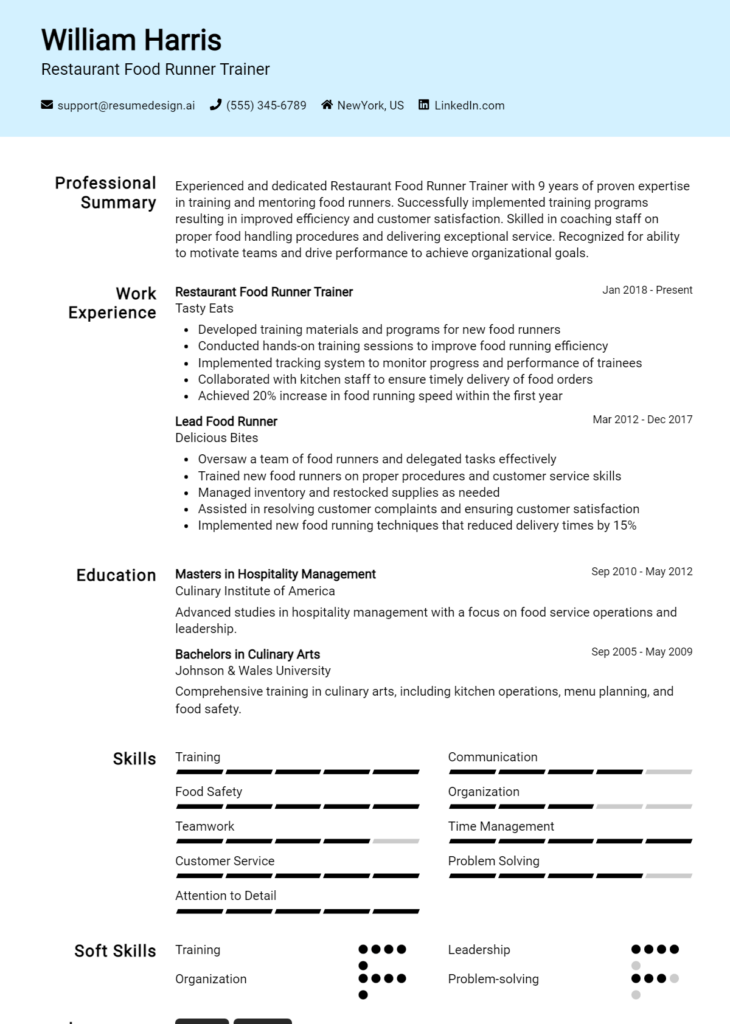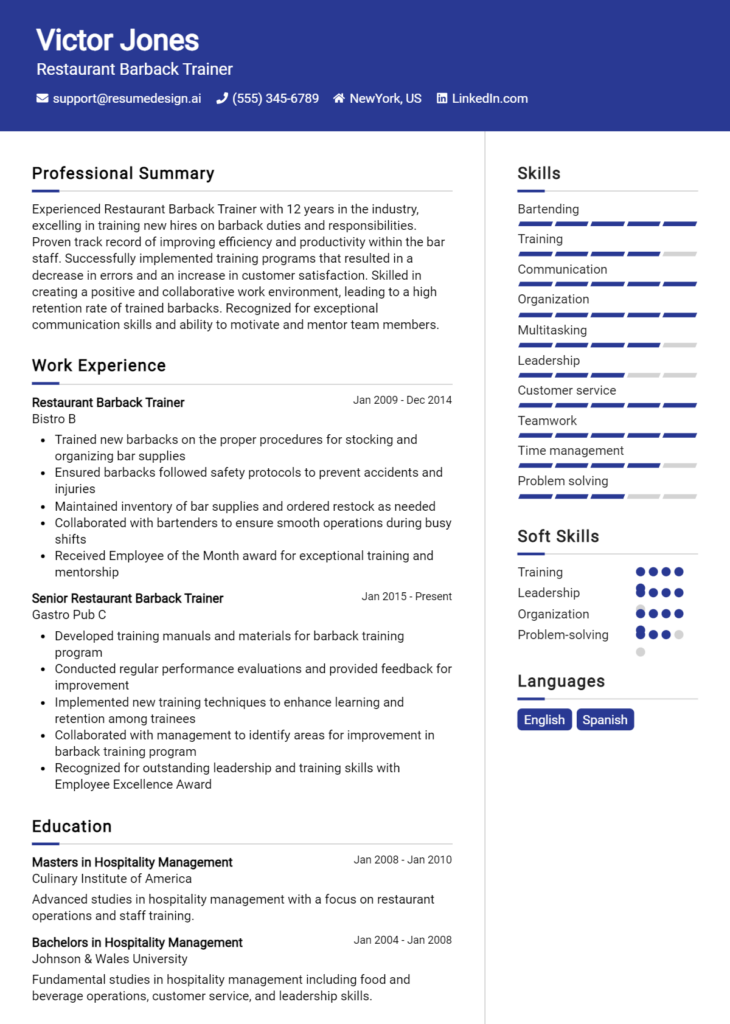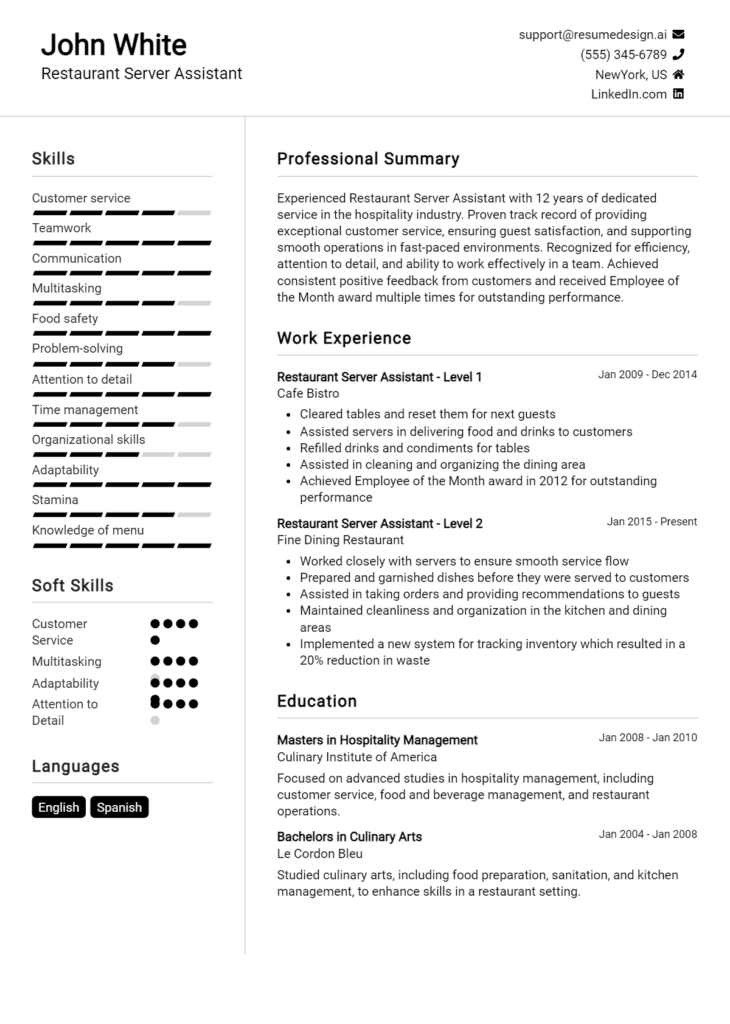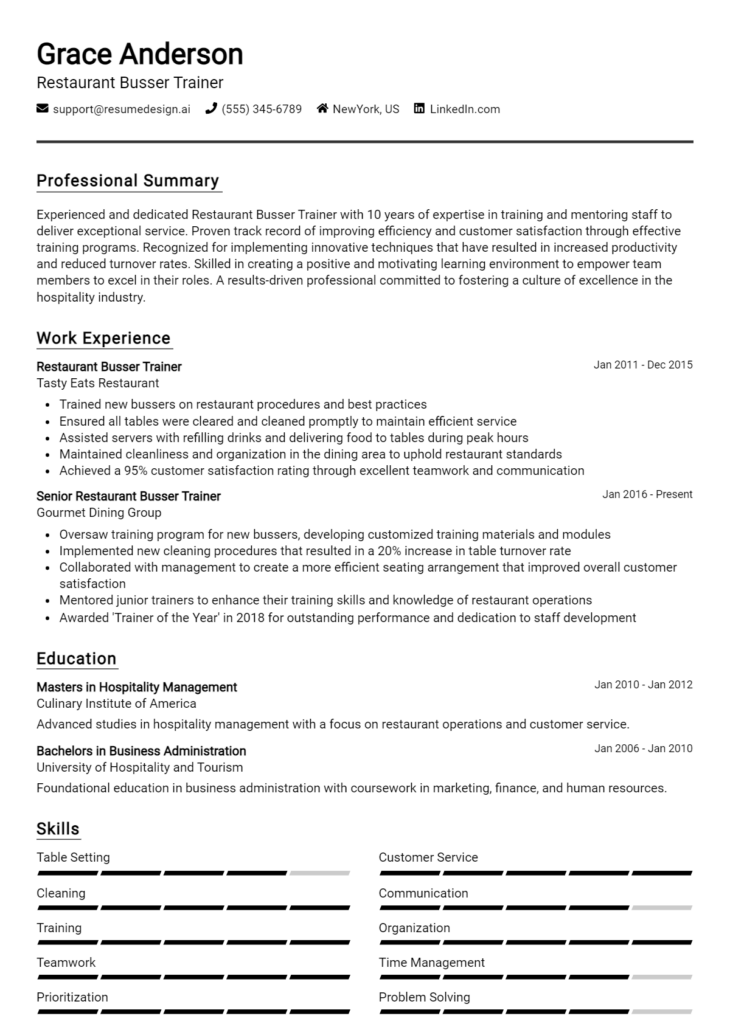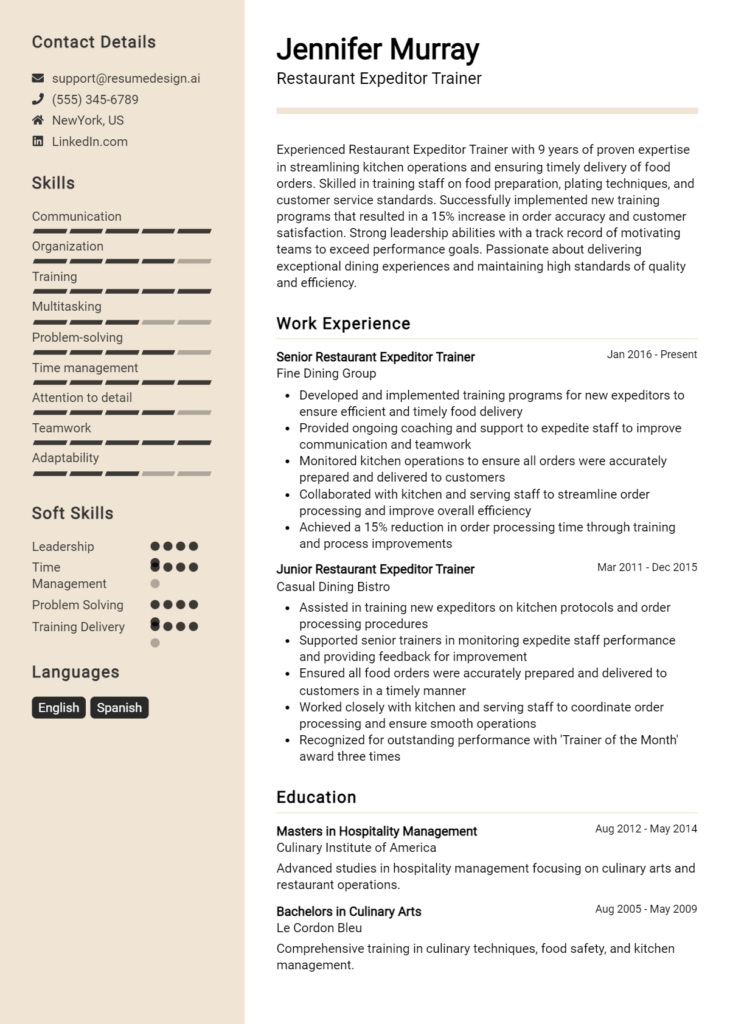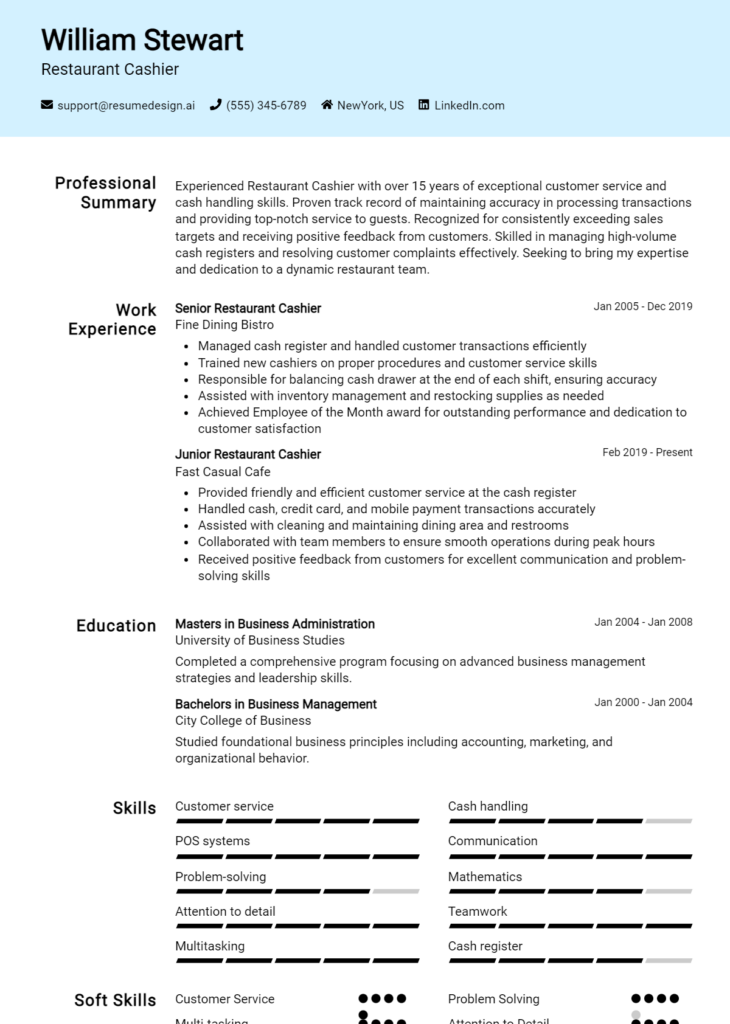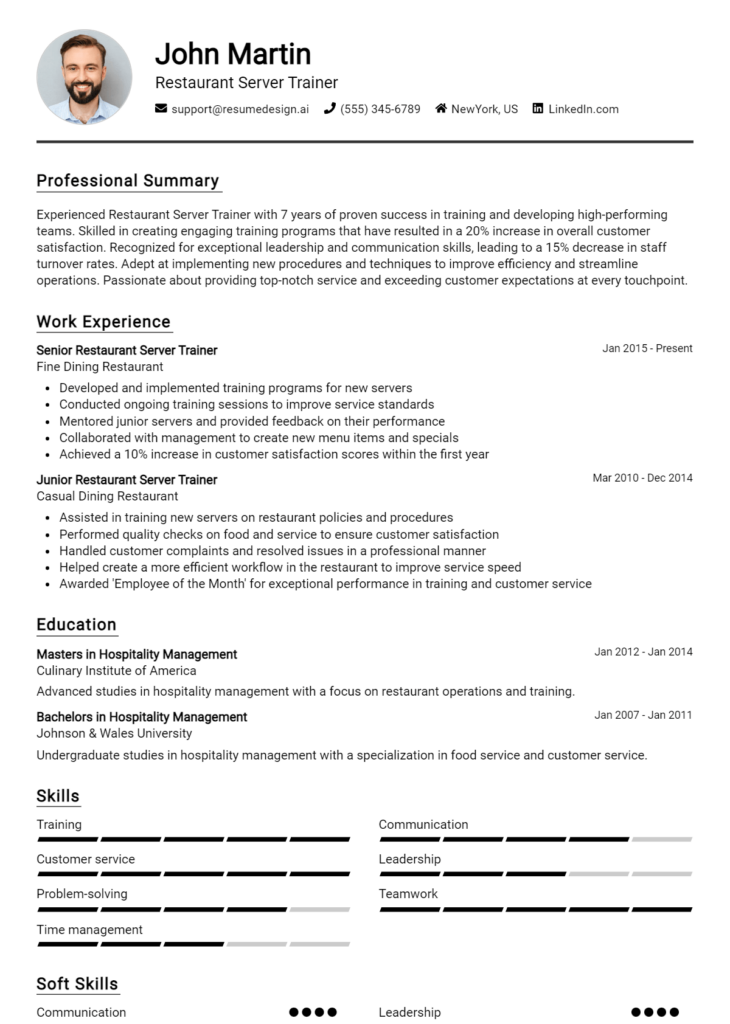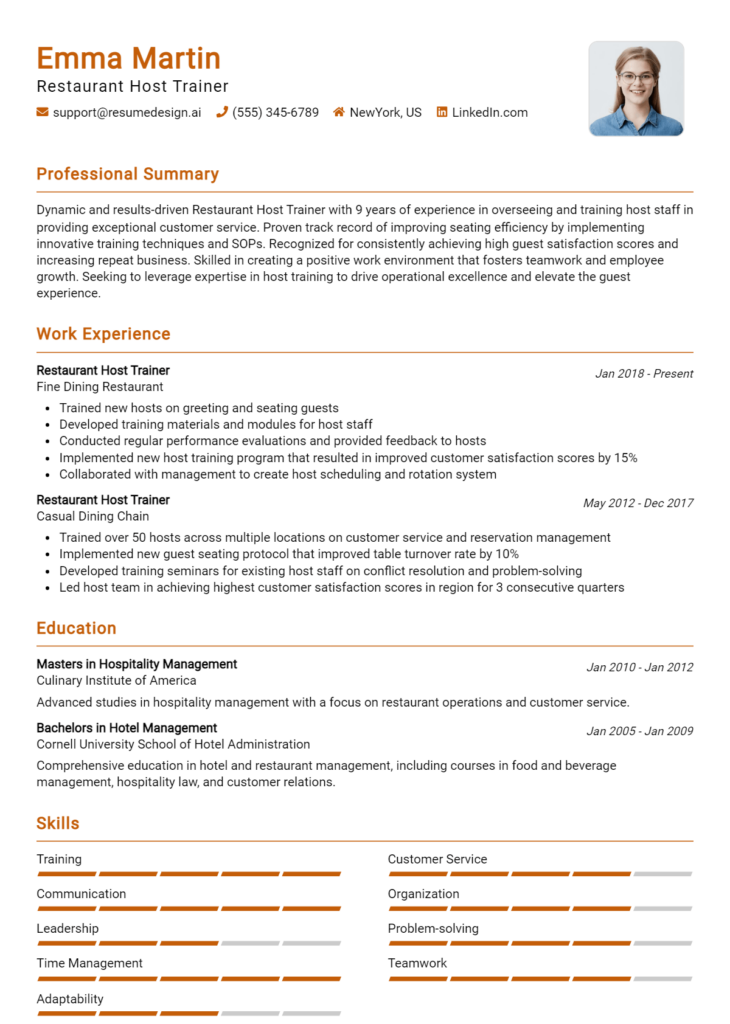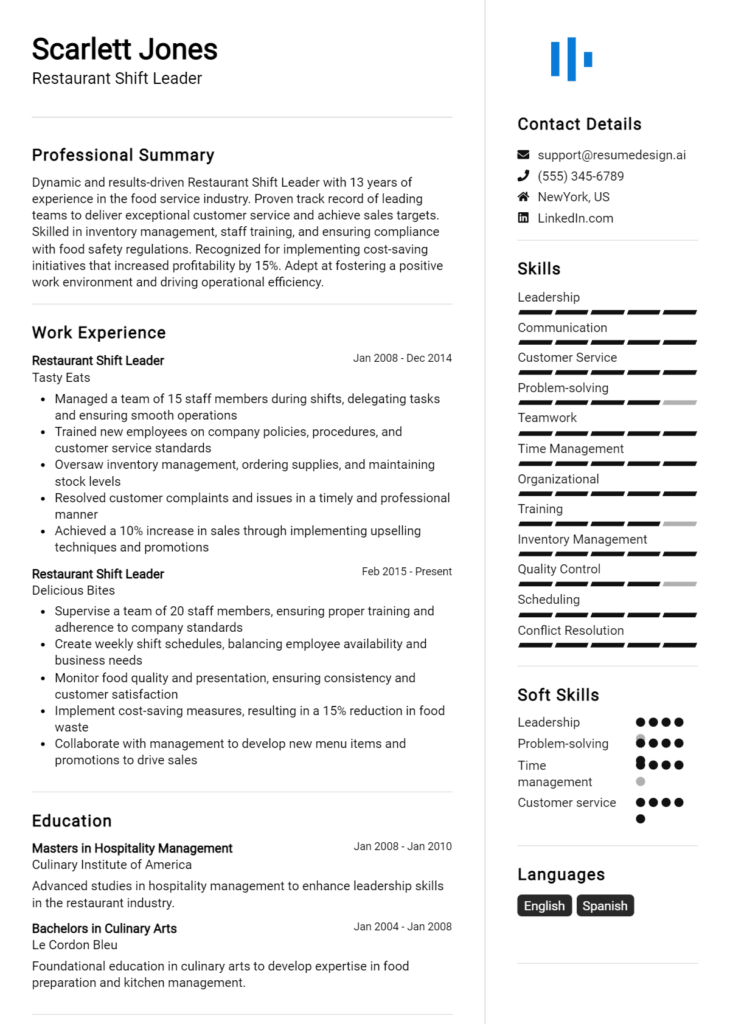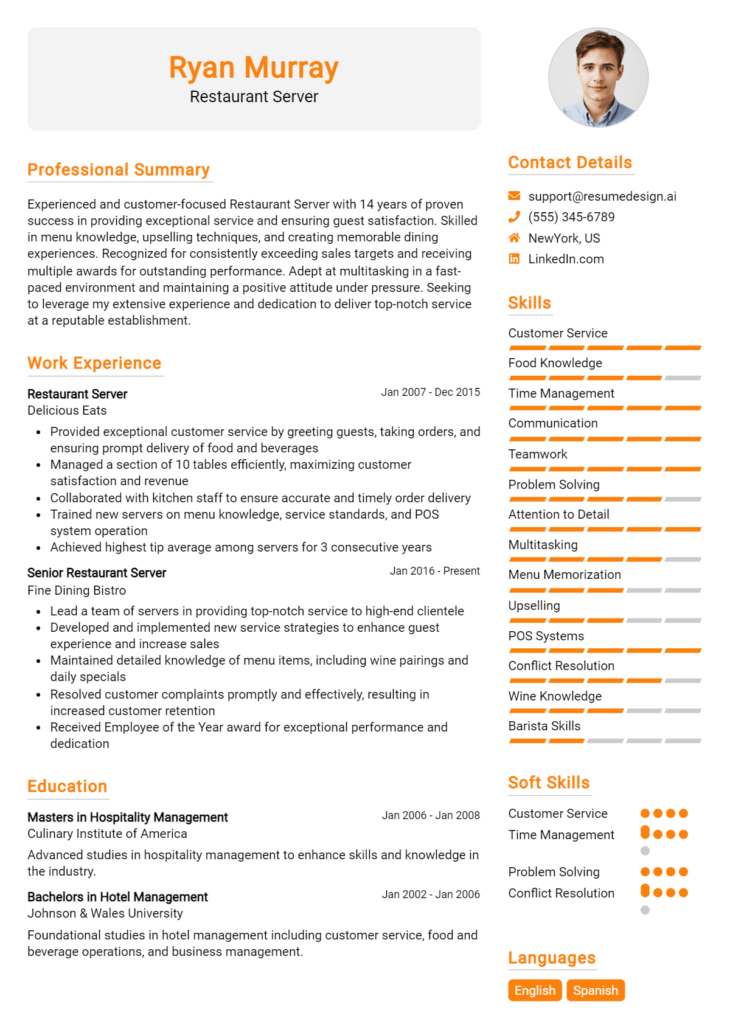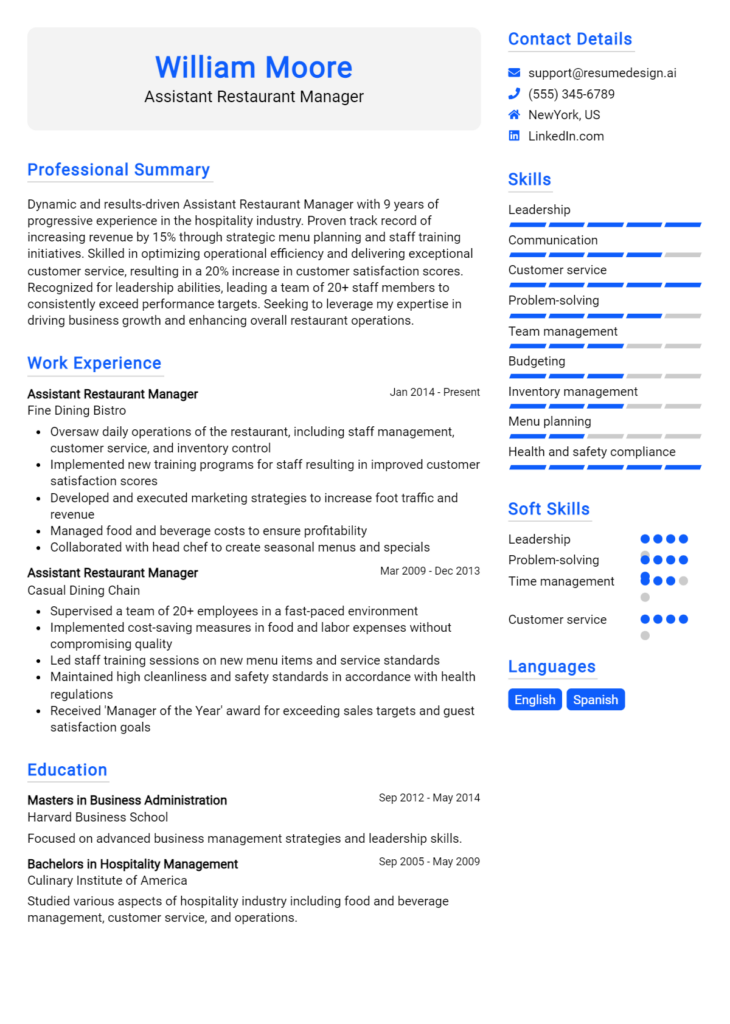Chief Compliance Officer Core Responsibilities
A Chief Compliance Officer (CCO) plays a critical role in ensuring that an organization adheres to legal standards and internal policies. Key responsibilities include developing compliance programs, conducting audits, and training staff on compliance matters. The CCO must bridge various departments such as legal, finance, and operations, requiring strong technical, operational, and problem-solving skills. These competencies not only support regulatory adherence but also contribute to the organization's overall objectives. A well-structured resume that highlights these qualifications is essential for showcasing the value a CCO brings to the company.
Common Responsibilities Listed on Chief Compliance Officer Resume
- Developing and implementing compliance policies and procedures.
- Conducting regular compliance audits and risk assessments.
- Providing training and guidance to staff on compliance issues.
- Monitoring regulatory changes and updating policies accordingly.
- Collaborating with legal and operational teams to mitigate risks.
- Reporting compliance status to senior management and the board.
- Investigating compliance violations and recommending corrective actions.
- Establishing a culture of compliance within the organization.
- Maintaining relationships with regulatory bodies and industry organizations.
- Tracking key compliance metrics and preparing reports.
- Advising on the impact of new laws and regulations on the organization.
High-Level Resume Tips for Chief Compliance Officer Professionals
In today's competitive job market, a well-crafted resume is essential for Chief Compliance Officer professionals seeking to make a lasting impression on potential employers. As the first point of contact between candidates and hiring managers, the resume serves not only as a summary of qualifications but also as a reflection of an individual's skills and achievements in compliance and regulatory frameworks. A striking resume can set the tone for the entire hiring process, showcasing your ability to navigate complex compliance landscapes and align with organizational goals. This guide will provide practical and actionable resume tips specifically tailored for Chief Compliance Officer professionals, ensuring that your application stands out.
Top Resume Tips for Chief Compliance Officer Professionals
- Tailor your resume to the specific job description by incorporating keywords and phrases that align with the requirements outlined by the employer.
- Highlight relevant experience in compliance, risk management, and regulatory affairs that directly relates to the position you are applying for.
- Quantify your achievements with specific metrics, such as the percentage of compliance improvements, cost savings, or successful audits you've overseen.
- Showcase industry-specific skills, such as familiarity with relevant laws, regulations, and compliance frameworks (e.g., GDPR, SOX, HIPAA).
- Emphasize leadership and management experience, detailing how you have led teams through compliance initiatives or projects.
- Include certifications relevant to compliance, such as Certified Compliance & Ethics Professional (CCEP) or Certified Regulatory Compliance Manager (CRCM).
- Utilize a clear and professional format, ensuring that your resume is easy to read and visually appealing to hiring managers.
- Incorporate a summary statement at the top of your resume that succinctly captures your career objectives and key qualifications.
- List professional affiliations or memberships in compliance organizations to demonstrate your commitment to the field.
By implementing these tips, Chief Compliance Officer candidates can significantly increase their chances of landing a job in this critical and rewarding field. A well-structured resume that effectively communicates your qualifications and accomplishments will not only attract the attention of hiring managers but also position you as a top contender for the role.
Why Resume Headlines & Titles are Important for Chief Compliance Officer
In the competitive landscape of compliance and risk management, the role of a Chief Compliance Officer (CCO) is critical in ensuring that organizations adhere to legal standards and internal policies. A well-crafted resume headline or title serves as the first impression for hiring managers, encapsulating a candidate's qualifications and unique value proposition in a single impactful phrase. This concise summary not only grabs attention but also sets the tone for the entire resume, making it essential that the headline is relevant and tailored to the specific job being applied for. A strong headline can effectively highlight key skills and experiences, making it easier for recruiters to quickly gauge whether a candidate is a suitable fit for the role.
Best Practices for Crafting Resume Headlines for Chief Compliance Officer
- Keep it concise: Aim for a headline of 10 words or less.
- Be role-specific: Use terminology and keywords relevant to the Chief Compliance Officer position.
- Highlight key qualifications: Focus on the most significant skills or achievements.
- Use strong action words: Choose powerful verbs that convey leadership and expertise.
- Tailor for each application: Customize headlines to align with the specific job description.
- Avoid jargon: Ensure clarity by avoiding overly technical terms that may confuse readers.
- Showcase value: Emphasize your ability to contribute to the organization’s compliance objectives.
- Maintain professionalism: Ensure the tone is formal and suits the corporate environment.
Example Resume Headlines for Chief Compliance Officer
Strong Resume Headlines
"Transformational Chief Compliance Officer with 15 Years of Experience in Risk Mitigation."
“Results-Driven Compliance Executive Specializing in Regulatory Frameworks & Policy Development.”
“Proven Leader in Compliance Strategy and Operational Excellence with a Focus on Ethical Standards.”
Weak Resume Headlines
“Looking for a Compliance Job.”
“Experienced Professional in Compliance.”
Strong resume headlines are effective because they clearly communicate the candidate's expertise and accomplishments in a manner that is both specific and engaging. They capture the essence of what the candidate brings to the table, making it easy for hiring managers to see their potential fit for the role. In contrast, weak headlines tend to be generic and lack focus, failing to convey the candidate's unique qualifications or the value they can provide. This vagueness can lead to disinterest from recruiters, who are often inundated with applications and rely on impactful headlines to identify top candidates quickly.
Writing an Exceptional Chief Compliance Officer Resume Summary
A resume summary is a critical component for Chief Compliance Officer candidates as it serves as the first impression for hiring managers. This brief section quickly captures attention by highlighting key skills, relevant experience, and notable accomplishments that align with the job role. An impactful summary should be concise and tailored specifically to the position being applied for, ensuring that it resonates with the employer's needs and effectively sets the tone for the rest of the resume.
Best Practices for Writing a Chief Compliance Officer Resume Summary
- Quantify achievements: Use specific numbers or percentages to demonstrate the impact of your work.
- Focus on skills: Highlight relevant compliance-related skills such as risk management, regulatory knowledge, and audit expertise.
- Tailor the summary: Customize your summary for the specific job description to align with the company's needs.
- Be concise: Aim for 3-5 sentences that encapsulate your professional identity and value proposition.
- Use action verbs: Start sentences with strong action verbs to convey a sense of proactivity and effectiveness.
- Showcase leadership: Emphasize any leadership roles or initiatives you have spearheaded in compliance efforts.
- Highlight certifications: Mention any relevant certifications, such as Certified Compliance & Ethics Professional (CCEP) or Certified Regulatory Compliance Manager (CRCM).
- Include industry-specific knowledge: Reference familiarity with regulations pertinent to the industry you’re applying to (e.g., finance, healthcare).
Example Chief Compliance Officer Resume Summaries
Strong Resume Summaries
Results-driven Chief Compliance Officer with over 10 years of experience in financial services, successfully leading compliance initiatives that reduced regulatory breaches by 30% year-over-year. Expert in risk assessment and policy development, with a proven ability to implement effective training programs across diverse teams.
Dynamic compliance leader with a track record of enhancing compliance frameworks, resulting in a 40% increase in audit score ratings. Skilled in navigating complex regulatory environments, with certifications in CCEP and CRCM, and a strong ability to foster cross-departmental collaboration.
Experienced Chief Compliance Officer adept at developing compliance strategies that align with corporate goals. Achieved a 25% reduction in compliance-related costs through process optimization and enhanced monitoring practices, while maintaining a 100% adherence rate to industry regulations.
Strategic compliance executive with expertise in healthcare regulations and a history of leading successful audits, achieving a 95% compliance rate during state inspections. Strong interpersonal skills and a commitment to cultivating a culture of compliance within the organization.
Weak Resume Summaries
Chief Compliance Officer with experience in various industries. I have worked on compliance issues and am familiar with regulations.
Dedicated compliance professional seeking to leverage my skills in a new role. I have been involved in compliance activities and understand the importance of following rules.
The examples presented illustrate the effectiveness of strong versus weak resume summaries. Strong summaries are characterized by their specificity, quantifiable results, and direct relevance to the Chief Compliance Officer role, showcasing the candidate's unique contributions and capabilities. In contrast, weak summaries lack detail, fail to quantify achievements, and come across as generic, making it difficult for hiring managers to gauge the candidate's true potential and fit for the position.
Work Experience Section for Chief Compliance Officer Resume
The work experience section of a Chief Compliance Officer (CCO) resume is a critical component that provides potential employers with a clear view of the candidate's professional journey and capabilities. This section not only highlights the candidate's technical skills in compliance, regulatory frameworks, and risk management but also demonstrates their leadership abilities in managing teams and projects effectively. By quantifying achievements and aligning experiences with industry standards, candidates can significantly enhance their appeal, showcasing their capacity to deliver high-quality results that align with organizational goals.
Best Practices for Chief Compliance Officer Work Experience
- Focus on quantifiable achievements to illustrate the impact of your work.
- Highlight specific compliance frameworks and regulatory standards you have mastered.
- Emphasize leadership experiences, showcasing your ability to manage and develop teams.
- Use action verbs and concise language to convey your contributions effectively.
- Align your experiences with industry trends and organizational needs.
- Incorporate relevant certifications and training that bolster your qualifications.
- Include examples of cross-departmental collaboration to highlight teamwork.
- Demonstrate adaptability by mentioning how you responded to changing regulations or challenges.
Example Work Experiences for Chief Compliance Officer
Strong Experiences
- Developed and implemented a comprehensive compliance program that reduced regulatory violations by 30% within the first year.
- Led a team of 10 compliance professionals, enhancing team efficiency by 25% through targeted training and performance management initiatives.
- Collaborated with cross-functional teams to integrate compliance protocols into existing business operations, resulting in a 40% increase in adherence to regulatory requirements.
- Conducted risk assessments that identified key vulnerabilities, leading to the implementation of new controls that mitigated risks by 50%.
Weak Experiences
- Responsible for compliance tasks and activities as needed.
- Worked with various teams to ensure compliance with regulations.
- Participated in compliance meetings and discussions.
- Assisted in the development of compliance policies and procedures.
The examples listed above illustrate the difference between strong and weak experiences in a Chief Compliance Officer's resume. Strong experiences provide specific, quantifiable outcomes that demonstrate the candidate's impact on the organization, showcasing their technical leadership and ability to collaborate effectively. In contrast, weak experiences are vague and lack detail, offering little insight into the candidate's actual contributions or achievements, which can significantly weaken their candidacy.
Education and Certifications Section for Chief Compliance Officer Resume
The education and certifications section of a Chief Compliance Officer resume is crucial as it serves to showcase the candidate's academic qualifications, industry-relevant certifications, and commitment to continuous learning. This section provides potential employers with insight into the candidate's foundational knowledge and specialized skills that are essential for navigating the complex regulatory landscape. By including relevant coursework, certifications, and specialized training, candidates can significantly enhance their credibility and demonstrate their alignment with the demands of the Chief Compliance Officer role.
Best Practices for Chief Compliance Officer Education and Certifications
- Include only relevant degrees and certifications that pertain to compliance, law, finance, or risk management.
- List your highest degree first, followed by any additional relevant qualifications in reverse chronological order.
- Highlight industry-recognized certifications such as Certified Compliance & Ethics Professional (CCEP) or Certified Regulatory Compliance Manager (CRCM).
- Provide specific coursework that is directly applicable to compliance issues, such as Risk Management, Corporate Governance, or Compliance Law.
- Include any ongoing education or professional development courses to showcase your commitment to staying current in the field.
- Use clear formatting to make it easy for hiring managers to scan and identify key qualifications.
- Consider including any relevant honors or distinctions that demonstrate your academic excellence.
- Keep this section concise and focused, avoiding any unrelated educational experiences or certifications.
Example Education and Certifications for Chief Compliance Officer
Strong Examples
- MBA in Compliance and Risk Management, ABC University, 2020
- Certified Compliance & Ethics Professional (CCEP), 2021
- Certificate in Regulatory Compliance, DEF Institute, 2019
- Coursework in Corporate Governance and Ethics, GHI University
Weak Examples
- Bachelor of Arts in English Literature, JKL University, 2010
- Certification in Basic First Aid, 2018
- Online Course in Social Media Marketing, 2020
- High School Diploma, MNO High School, 2006
The examples categorized as strong are relevant and demonstrate a clear alignment with the necessary qualifications for a Chief Compliance Officer role. They showcase specialized education and certifications that are recognized within the compliance field. Conversely, the weak examples highlight educational qualifications and certifications that lack relevance to the role, such as those unrelated to compliance or those that do not enhance the candidate's expertise in the industry.
Top Skills & Keywords for Chief Compliance Officer Resume
In the dynamic landscape of corporate governance and regulatory compliance, the role of a Chief Compliance Officer (CCO) is pivotal in safeguarding an organization’s integrity and reputation. A well-crafted resume for a CCO must highlight a blend of both hard and soft skills, as these competencies are essential for navigating the complexities of compliance frameworks, risk management, and ethical standards. Demonstrating a robust skill set not only enhances the credibility of the candidate but also aligns with the expectations of stakeholders and regulatory bodies. A clear articulation of relevant skills can significantly impact how a CCO presents their qualifications and experiences, ultimately leading to career advancement opportunities.
Top Hard & Soft Skills for Chief Compliance Officer
Soft Skills
- Leadership
- Communication
- Critical Thinking
- Problem-Solving
- Ethical Judgment
- Interpersonal Skills
- Adaptability
- Conflict Resolution
- Decision-Making
- Team Collaboration
- Negotiation
- Emotional Intelligence
- Time Management
- Attention to Detail
- Analytical Thinking
Hard Skills
- Regulatory Knowledge
- Risk Assessment
- Compliance Auditing
- Policy Development
- Data Analysis
- Legal Research
- Financial Analysis
- Industry Standards Knowledge (e.g., ISO, GDPR)
- Training and Development
- Project Management
- IT Compliance
- Reporting and Documentation
- Strategic Planning
- Business Continuity Planning
- Contract Management
- Investigative Skills
- Knowledge of Compliance Software
- crisis management
For a comprehensive understanding of how to effectively showcase these skills and to highlight relevant work experience, candidates should tailor their resumes to reflect their unique qualifications and readiness to lead compliance initiatives.
Stand Out with a Winning Chief Compliance Officer Cover Letter
I am writing to express my interest in the Chief Compliance Officer position at [Company Name] as advertised on [where you found the job listing]. With over [X years] of experience in compliance management and a proven track record of developing and implementing effective compliance programs, I am excited about the opportunity to contribute to your organization’s commitment to ethical business practices and regulatory adherence.
In my previous role as [Your Previous Job Title] at [Your Previous Company], I successfully led a team in conducting comprehensive risk assessments that identified potential compliance gaps and implemented corrective actions. My hands-on experience in navigating complex regulatory environments, coupled with my ability to foster collaborative relationships across departments, has enabled me to create a culture of compliance that aligns with corporate goals. I have a strong understanding of industry regulations such as [specific regulations relevant to the position], and I am adept at translating these requirements into actionable strategies that minimize risk and enhance operational efficiencies.
I am particularly drawn to [Company Name] because of your commitment to [specific value or initiative of the company], and I believe my proactive approach and innovative mindset will complement your existing compliance framework. I am excited about the opportunity to lead compliance initiatives that not only meet regulatory standards but also promote a culture of integrity and accountability throughout the organization. My strong analytical abilities and attention to detail will ensure that compliance policies are not only in place but are also effectively communicated and enforced across all levels of the organization.
Thank you for considering my application. I look forward to the possibility of discussing how my experience and vision for compliance can contribute to the continued success of [Company Name]. I am eager to bring my expertise in compliance management to your team and help safeguard the organization against potential risks while promoting a robust ethical culture.
Common Mistakes to Avoid in a Chief Compliance Officer Resume
In the competitive landscape of compliance, a Chief Compliance Officer (CCO) must present a compelling resume that not only highlights their expertise but also effectively communicates their value to potential employers. However, many candidates fall into common pitfalls that can undermine their chances of standing out. By avoiding these mistakes, a CCO can create a resume that truly reflects their qualifications and aligns with the expectations of hiring organizations.
Lack of Specificity: Failing to provide specific examples of compliance programs or initiatives led can make a resume too vague. Highlighting measurable impacts enhances credibility.
Overloading with Jargon: Using excessive industry jargon or acronyms can alienate readers. It's crucial to balance technical terms with clear language to ensure understanding.
Ignoring Soft Skills: Emphasizing only technical skills while neglecting soft skills like leadership, communication, and problem-solving can limit the appeal to employers who value these traits.
Neglecting Quantifiable Achievements: Presenting responsibilities without quantifying achievements (e.g., "reduced compliance violations by 30%") fails to demonstrate the effectiveness of past roles.
Inconsistent Formatting: A disorganized or inconsistent layout can detract from the professionalism of a resume. Consistent formatting enhances readability and creates a polished appearance.
Failing to Tailor the Resume: Using a one-size-fits-all resume for different job applications can miss the mark. Tailoring content to match the specific requirements of each role shows genuine interest and effort.
Omitting Relevant Certifications: Not listing relevant certifications or continuing education can overlook important qualifications. These credentials can set a candidate apart in a competitive field.
Lacking a Strong Summary Statement: Starting with a weak or generic summary fails to capture the reader's attention. A strong, targeted summary should clearly outline the candidate's unique value proposition.
Conclusion
In conclusion, the role of a Chief Compliance Officer (CCO) is vital in today's regulatory landscape. CCOs are responsible for ensuring that organizations adhere to laws, regulations, and internal policies, which protects the organization from legal risks and fosters ethical business practices. Key responsibilities include developing compliance programs, conducting audits, overseeing training initiatives, and serving as a liaison with regulatory bodies.
As the demand for skilled compliance professionals continues to grow, it’s essential for CCOs to present themselves effectively through their resumes. An impactful resume can highlight your relevant experience, skills, and accomplishments, making you stand out in a competitive job market.
We encourage you to take a moment to review your Chief Compliance Officer resume and ensure it accurately reflects your qualifications. To assist you in this process, consider utilizing the following resources:
- Explore various resume templates to find a style that fits your professional image.
- Use the resume builder to create a polished and professional resume tailored to your experience.
- Check out resume examples to gain inspiration and insights on how to structure your content effectively.
- Don’t forget to craft a compelling cover letter using our cover letter templates to complement your resume.
By leveraging these tools, you can enhance your resume and increase your chances of landing your next role as a Chief Compliance Officer. Take the first step towards advancing your career today!

